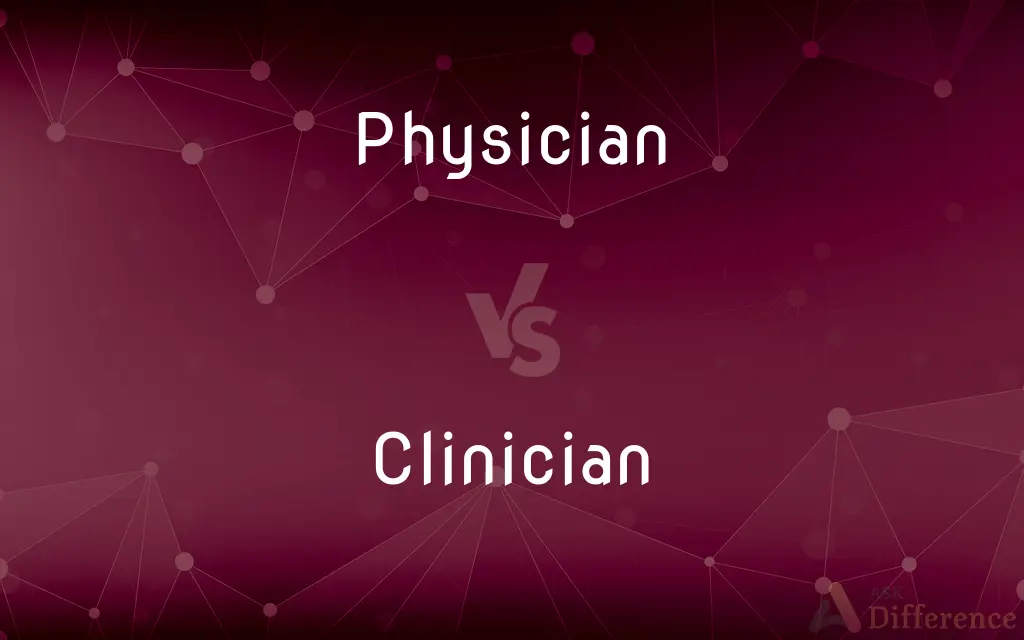Physician vs. Clinician — What's the Difference?
By Tayyaba Rehman — Updated on January 14, 2024
A physician is a medical professional who diagnoses and treats illnesses, typically holding a Doctor of Medicine (MD) or Doctor of Osteopathic Medicine (DO) degree. A clinician is broader term that includes physicians and other healthcare professionals.

Difference Between Physician and Clinician
Table of Contents
ADVERTISEMENT
Key Differences
Physicians are specifically trained in the study of medicine and are qualified to practice medicine. They diagnose and treat diseases, prescribe medications, and perform surgeries. Clinicians encompass a broader range of healthcare professionals, including nurses, physician assistants, physical therapists, and psychologists, in addition to physicians.
To become a physician, one must complete medical school and a residency program, often followed by a fellowship in a specialized area. The training and education required for clinicians vary based on their specific role and field within healthcare.
Physicians are primarily responsible for medical diagnosis and treatment plans, focusing on physical health. Clinicians may focus on various aspects of healthcare, including mental health, rehabilitation, and patient education, depending on their specialization.
The role of a physician is often centered in hospitals, clinics, or private practices. Clinicians work in diverse settings, including hospitals, schools, community health centers, and mental health facilities.
The term 'physician' is more specific and universally understood to refer to a medical doctor. 'Clinician' is a broader term and may require further clarification to specify the practitioner's exact role in healthcare.
ADVERTISEMENT
Comparison Chart
Definition
Medical doctor with an MD or DO degree
Broad term for healthcare professionals
Training
Medical school, residency, possible fellowship
Varies by specific healthcare role
Focus
Diagnosis and treatment of diseases
Various aspects of patient care
Workplace
Hospitals, clinics, private practices
Diverse settings including schools, hospitals
Role Clarity
Specifically refers to a medical doctor
Encompasses a range of healthcare professionals
Compare with Definitions
Physician
A physician is a medical doctor who diagnoses and treats illnesses.
The physician diagnosed the patient with pneumonia and prescribed antibiotics.
Clinician
A clinician is a healthcare professional engaged in patient care.
The clinician provided therapy for patients with chronic pain.
Physician
Physicians undergo extensive medical training and licensure.
After years of training, she became a licensed physician.
Clinician
The term clinician encompasses a broad range of healthcare roles.
Clinicians in the mental health field provide essential counseling services.
Physician
They often work in hospitals or private medical practices.
The physician sees patients in his clinic every weekday.
Clinician
Clinicians work in diverse healthcare settings.
She works as a clinician in a community health center.
Physician
Physicians can specialize in various fields like cardiology or neurology.
As a cardiology physician, she focuses on heart-related disorders.
Clinician
They focus on various aspects of healthcare, from treatment to rehabilitation.
The physical therapist clinician helped patients regain mobility.
Physician
They play a critical role in patient healthcare and medical decision-making.
The physician made crucial decisions during the emergency surgery.
Clinician
Clinicians include nurses, therapists, and physician assistants.
As a nurse, she is a vital part of the clinician team in the hospital.
Physician
Hence, figuratively, one who ministers to moral diseases; as, a physician of the soul.
Clinician
A clinician is a health care professional who works as a caregiver of a patient in a hospital, skilled nursing facility, clinic, or patient's home. Clinicians work directly with patients rather than in a laboratory or as a researcher.
Physician
A physician (American English), medical practitioner (Commonwealth English), medical doctor, or simply doctor, is a professional who practices medicine, which is concerned with promoting, maintaining or restoring health through the study, diagnosis, prognosis and treatment of disease, injury, and other physical and mental impairments. Physicians may focus their practice on certain disease categories, types of patients, and methods of treatment—known as specialities—or they may assume responsibility for the provision of continuing and comprehensive medical care to individuals, families, and communities—known as general practice.
Clinician
A health professional, such as a physician, psychologist, or nurse, who is directly involved in patient care, as distinguished from one who does only research or administrative work.
Physician
A person trained and licensed to practice medicine; one who has a Doctor of Medicine or a Doctor of Osteopathic Medicine degree.
Clinician
Any healthcare practitioner working at the point of care, in clinical#Adjective practice (e.g., physicians in clinical medicine, nurses in nursing#Noun practice, or allied health#Noun providers in practice).
Physician
(Archaic) A person who practices general medicine as distinct from surgery.
Clinician
Someone who conducts a clinic; an expert or skilled practitioner in a particular field, such as business or education. In this sense, a clinician is someone who provides practical advice or hands-on assistance to others in a specific area of expertise. For example, a business clinician might be an experienced consultant who helps companies improve their operations, while an education clinician might be a skilled teacher who provides professional development and support to other educators.
Physician
A person who heals or exerts a healing influence.
Clinician
A practitioner (of medicine or psychology) who does clinical work instead of laboratory experiments
Physician
A practitioner of physic, i.e. a specialist in internal medicine, especially as opposed to a surgeon; a practitioner who treats with medication rather than with surgery.
Physician
A medical doctor trained in human medicine.
Physician
A person skilled in physic, or the art of healing; one duty authorized to prescribe remedies for, and treat, diseases; a doctor of medicine.
Physician
A licensed medical practitioner;
I felt so bad I went to see my doctor
Common Curiosities
Can a nurse be considered a clinician?
Yes, a nurse is considered a clinician, as they provide direct patient care.
Are psychologists classified as clinicians?
Yes, psychologists are considered clinicians, as they provide mental health care.
What is the main difference in training between a physician and other clinicians?
Physicians undergo more extensive training, including medical school and residency, which is more specialized than the training for other clinicians.
What qualifications are needed to become a physician?
A medical degree (MD or DO), residency training, and a medical license are needed to become a physician.
Can a clinician specialize in a specific area of healthcare?
Yes, many clinicians, like physicians, nurses, and therapists, can specialize in specific areas of healthcare.
Do all physicians perform surgery?
No, only physicians who are trained and specialized in surgery perform surgical procedures.
Is a physician assistant (PA) a physician?
No, a PA is not a physician but is a clinician who works under the supervision of a physician.
Can a clinician prescribe medication?
Some clinicians, like physicians and certain advanced practice nurses, can prescribe medication.
Can clinicians diagnose and treat illnesses?
Yes, many clinicians, including physicians, PAs, and some nurses, can diagnose and treat illnesses.
What role do clinicians play in preventive healthcare?
Clinicians play a key role in preventive healthcare, including conducting screenings, providing vaccinations, and offering health education.
Can the terms physician and clinician be used interchangeably?
While they are related, they should not be used interchangeably, as 'physician' refers specifically to a medical doctor, whereas 'clinician' is a broader term including a range of healthcare professionals.
Do all clinicians need to be licensed?
Most clinicians, especially those providing direct patient care, need to be licensed or certified in their field.
Is the role of a physician more focused than that of a clinician?
Yes, the role of a physician is more specifically focused on medical diagnosis and treatment, while 'clinician' is a broader term.
Are there different types of physicians?
Yes, there are many types of physicians, including general practitioners and specialists in fields like pediatrics, cardiology, and neurology.
Do clinicians work collaboratively in healthcare settings?
Yes, clinicians often work collaboratively in healthcare settings to provide comprehensive patient care.
Share Your Discovery

Previous Comparison
Chance vs. Choice
Next Comparison
Gallop vs. TrotAuthor Spotlight
Written by
Tayyaba RehmanTayyaba Rehman is a distinguished writer, currently serving as a primary contributor to askdifference.com. As a researcher in semantics and etymology, Tayyaba's passion for the complexity of languages and their distinctions has found a perfect home on the platform. Tayyaba delves into the intricacies of language, distinguishing between commonly confused words and phrases, thereby providing clarity for readers worldwide.















































